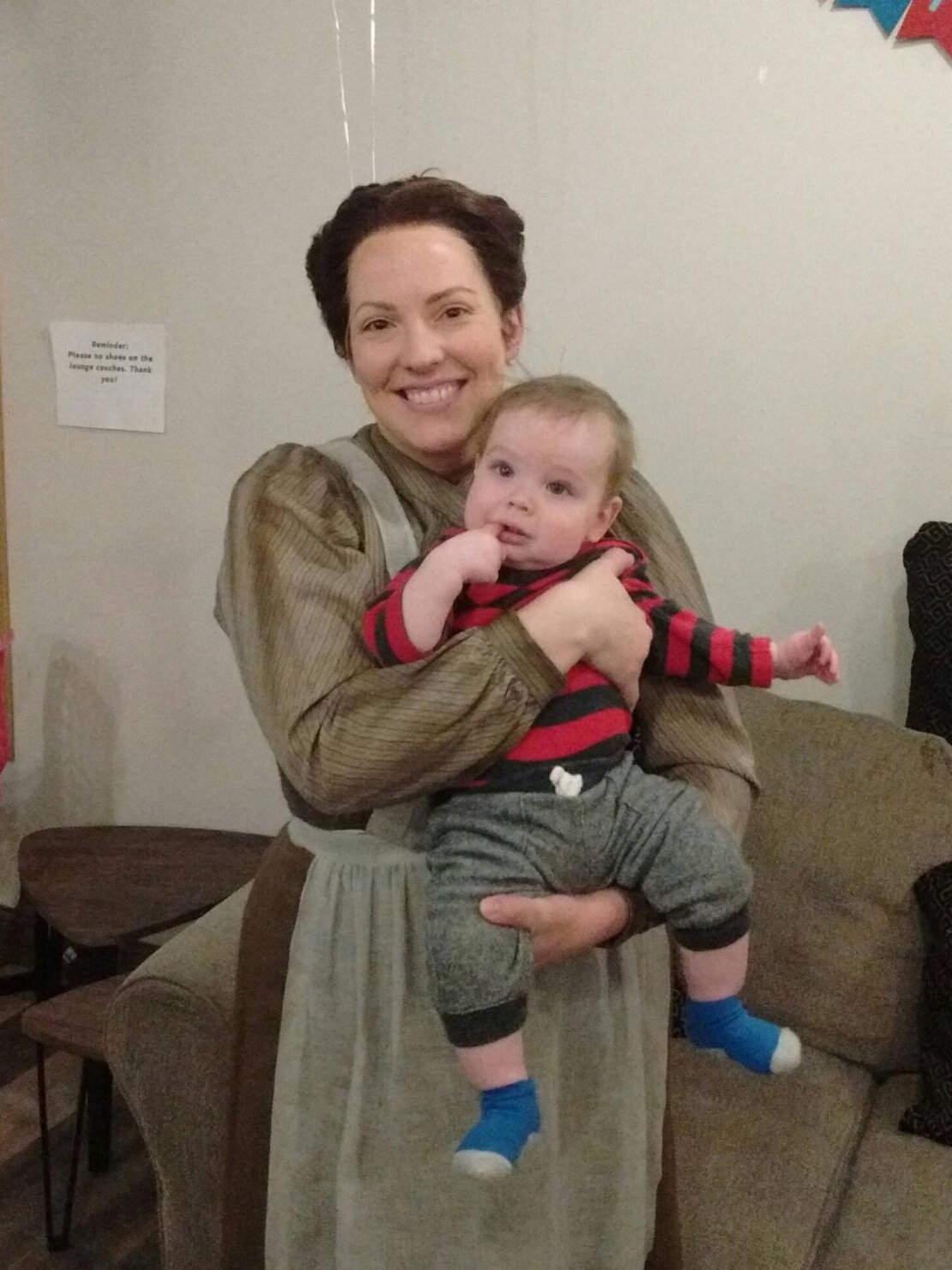Motherhood At The Met
About thirty seconds after I got a full-time position in the Met Chorus, I got pregnant. Ok, it wasn’t quite that quick. But it did happen fast, and my son Arthur was born the summer after my first season.
Both the job and the baby were a long time coming. Every chorister has a fun story about getting “the call,” and the short version of mine is this: I knew I had something to offer as a singer, and one morning, during a yoga class, I sent up an earnest plea for an opportunity to contribute. Thirty minutes later, as I walked in the door of my day job, Maestro Palumbo called.
As for the baby, my husband and I had been trying to get pregnant for two years. Nice work if you can get it, of course, but I grew increasingly devastated when month after month went by without success. Having two dreams come true almost at once was an embarrassment of riches.
I was further blessed with an easy pregnancy, and with my late June due date, the Met season wrapped up when I was seven-and-a-half months in. I especially appreciated this given the physical nature of the job. Life in the chorus involves a lot of running around, climbing stairs, kneeling, getting up and down off the floor, and, oh yeah, singing. None of this is made easier by being pregnant. The other benefit of a summer baby is that I didn’t have to start my maternity leave until after the summer break was over, giving me a couple extra precious weeks to be at home with my baby.
I started back at work in late September, right at the start of the 19/20 season. But while the performance season was just getting under way, the chorus had been rehearsing since July. This meant that when I came back, I was behind. This was especially challenging because as a second-year chorister I was, by default, behind already.
Depending on who you ask, the first three years in the Regular Chorus are the hardest. Or five years. Or seven. The Met does at least twenty operas per season, and the chorus is in almost all of them. Because they have not figured out how to add extra hours to the day, shows that are done often like La Bohème or Turandot don’t receive as much rehearsal as something rare, like Akhnatan or The Queen of Spades. This means that in your early years in the chorus, you are going to be spending a lot of time practicing, muttering to yourself while looking at flashcards, and reading the lips of your seasoned colleagues, all in an effort to stuff dozens of operas, in myriad languages, into your brain.
Turandot was my first show back, and I employed all of the above strategies to get up to speed. My son became a Turandot expert as I practiced during the last few weeks of my leave. Not only did I need to learn the music, I also needed to get my voice back into shape. Singing opera is an athletic endeavor that requires precision and endurance. Even just a couple days off can set you back, just like a week away from your exercise routine can make you feel like you’re starting over. I didn’t sing at all for several weeks after Arthur was born—that is, unless you count crooning “Somewhere Over the Rainbow” over and over and over.
Once my body had recovered from labor and I was starting to patch together a decent amount of sleep, I got back to work. At first I could only manage ten minutes or so at a time, both in terms of stamina and in terms of time in which Arthur would tolerate me not paying attention to him. Sometimes I would hold him while I vocalized, but I worried about singing so close to his ears. Opera singing is loud, after all! Over time I was able to lengthen my sessions until, by the time I started back at work, I felt almost back to normal.
Now Arthur is seven months old, and we have a nice routine. He usually sleeps in until 7:00 or so, which on all but the latest nights gives me a decent amount of sleep, too. Depending on how early our rehearsal call is, I have about ninety minutes with him in the morning, which goes by fast when I’m also trying to get ready to go. My goal is to be able to take ten minutes to drink a cup of tea and watch him play around on the floor, and most mornings I am able to manage this. It can be hard to walk out the door, but once I’m in the midst of rehearsing I’m glad to be doing the thing I trained for so many years to do.
Unless we have a very short break, I come home in the afternoon between rehearsal and performance (which choristers call the “gap”). Depending on the timing, this means more play-time and/or flying through some chores while Arthur naps. He goes to bed around 8:00pm, which is kind of late for babies. But since his mama often doesn’t get home from work until 11:00pm, I want to make sure he doesn’t wake up too early! This is—fingers crossed—working out well so far. On nights that the chorus doesn’t appear until late in the game, such as Der Rosenkavalier or Wozzeck, I can put Arthur to bed before I go, which is a nice treat.
As every working parent knows, balancing professional life and family life is tough. But I take heart in the fact that many of my colleagues have raised or are raising kids while in the Met chorus, to say nothing of the millions of parents doing it with jobs of all kinds. In the end, I love my job and I love being a mom. I’m sure that a happy, fulfilled mom is a good first step to a happy, fulfilled child.
Someone recently said to me, after we caught up about my job in the chorus and my at-last baby, “You’re living the dream, aren’t you?” Yeah, I kinda am. It’s every bit as wonderful as I imagined, and I’m deeply grateful.



